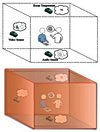Ubiquitous computing gone mad
“In the future rush to get to work, the day’s tasks will be checked using a personal robotic butler, the misplaced car keys will be located by entering the word “keys” into a cellphone and getting a call back saying “bedroom.” The children will be monitored by sensors that detect their every movement. At work, the office map uses the same kind of sensors to track down staff members for a meeting. The work day is interrupted by a break to play with the cat remotely over the Internet. After work, the ads on the shopping mall wall reconfigure to suit each person passing by, so when there is a sign for a concert, you buy a ticket by waving your cellphone over the billboard. At home that night, the phone programs the dishwasher and washing machine to run while the family sleeps.”
The article is unfortunately based on what happened at the 5th International Conference on Pervasive Computing held in Toronto, Ontario, Canada, on May 13-16, 2007.
Luckily there were Adam Greenfield and Apu Kapadia (a post-doctoral research fellow at Dartmouth College in New Hampshire) to bring some sense to the madness, but they seem to have been lone wolves crying. And even Greenfield was not optimistic, as he believes that the only bastion for privacy in this technological future may be in the home: “I think in public space, the battle is already over, and the forces of privacy have lost.”
In a long post, computer consultant Roland Piquepaille reflects on these problems, asks what can be done to protect our privacy, and provides some more depth on the issue.
(via SmartMobs)




